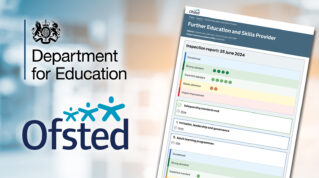In just under a month’s time, Ofsted will roll out its revised Education Inspection Framework (EIF) for further education and skills providers. On paper, it looks like progress: the single overall judgment is gone, replaced by multi-domain report cards. And the proposal for a five-day inspection notice period championed by the Fellowship of Inspection Nominees (FIN) has been retained. The framework also upholds the principles of belonging, thriving and inclusion, which is commendable.
But dig a little deeper and some cracks appear. While the revisions are well suited to full-time study programmes delivered by colleges, they fall short for apprenticeships or employment-focused provision that serves learners of all ages and at all stages of life. Apprenticeships are no longer a second-best alternative to university; they are, for many, the preferred route: debt-free, valued by employers and offering a purposeful journey to career progression. Skills bootcamps and short employer-led courses similarly can provide efficient, impactful routes into employment. Yet the framework does not pay enough attention to these realities and misses the opportunity to lean into this optimism and create a futureproofed framework.
One key reason may be the limitations of the inspection workforce itself. Inspectors are trained in education, not industry. Their expertise equips them to assess teaching, learning and basic employer engagement, but they often lack the foresight to understand industry needs, workforce planning or the wider economic impact of training programmes. Ofsted has acknowledged the need to address this but feedback from the pilots suggests that we still have a long way to go before this fundamental flaw is rectified and it certainly won’t be fixed before November.
FIN supports the new emphasis on inclusion but in our submission, we asked for a definition of inclusion, a statement on what constituted “barriers to learning” and clear guidelines to ensure fair assessments across all types of providers. While the new toolkit includes a response to this, it has not sufficiently recognised the challenges faced by independent training providers in this regard, particularly as these providers don’t receive the same level of funding support allocated to other institutions.
This brings us to the data which Ofsted looks at. The inspectorate has much to say on learner achievement; it says it will consider learner progress and an individual learner’s starting point. But for FIN, there is too much emphasis on achievement rather than progress. As someone providing governance and oversight for multiple providers, including those rated outstanding, I see the value of data scrutiny. However, the balance here has tipped in the wrong direction. The framework is now more about producing numbers for the government than capturing the full impact of FE and skills on learners and employers.
On the issue of governance, Ofsted have again disappointed. Inspection reports will name the chair of governors. But in our case for stronger oversight, we called for evidence that a college or provider board included members who were impartial or independent. This requirement has not been forthcoming.
The new framework could have been an opportunity to address better:
- Employer satisfaction: Are businesses gaining skilled staff through work-based learning?
- Return on investment: Do programmes improve productivity and retention?
- Career progression: Are learners advancing in roles and qualifications?
- Inclusion: Are providers driving inclusion through proactive support systems, not surveillance?
- Post-16 choices: Are Ofsted reports offering clear information for learners and employers choosing between providers?
Although LSIPs don’t get a mention (but inspectors consulting employer representative bodies do), all providers will now be assessed under the five-grade system for their local and sector impact.
The revised framework is a step forward in transparency and fairness, particularly for colleges delivering full-time programmes. It is also right that the toolkit retains scrutiny on maths and English for learners without level 2 attainment.
But for apprenticeships, employer-led training and other employment-focused programmes, it is still a missed opportunity. Until inspections reflect the realities of the workplace, the economic value of FE and skills, and the preferences of learners choosing apprenticeships over university, the framework will remain incomplete.
















Your thoughts